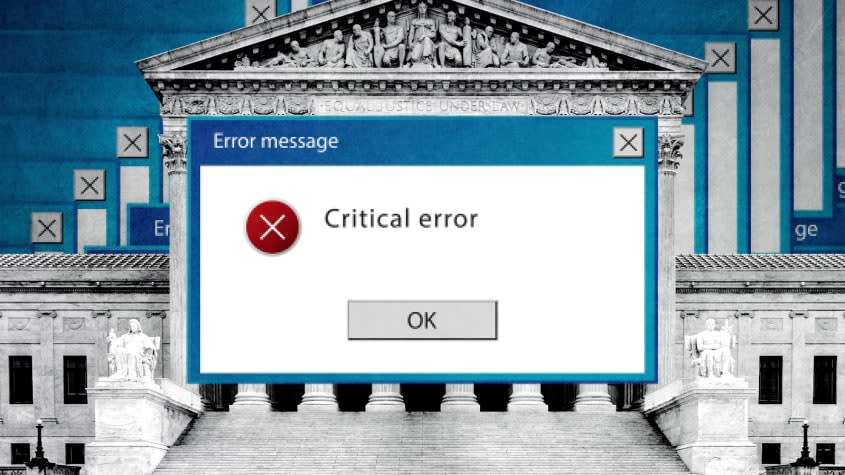The Supreme Court and the future of the internet

- Oops!Something went wrong.Please try again later.
The Supreme Court is about to decide the future of the internet.
The court this week agreed to hear a case involving Section 230 of the Communications Decency Act, which shields internet providers from lawsuits over material posted online by users. The law "helped enable the rise of huge social networks like Facebook and Twitter," reports The New York Times, by ensuring they couldn't get sued every time a user posted something false or inflammatory.
But Section 230 "has come under heavy scrutiny from the right and the left in recent years," NBC News reports, "with conservatives claiming that companies are inappropriately censoring content and liberals saying social media companies are spreading dangerous right-wing rhetoric." What will happen to the internet if Section 230 goes away? Here's everything you need to know:
What is Section 230?
It's "one of the most valuable tools for protecting freedom of expression and innovation on the internet," according to the Electronic Frontier Foundation. That's a bit ironic, since the purpose of the Communications Decency Act was originally designed to prevent young kids from encountering obscene materials in what was then called "cyberspace." But Section 230 of the law also held that "no provider or user of an interactive computer service shall be treated as the publisher or speaker of any information provided by another information content provider."
That means the law "protects websites from lawsuits if a user posts something illegal," Casey Newton wrote for The Verge in 2020. (Practically, it allows YouTube to let millions of users upload and publish videos without worrying about getting sued if one of them posts something out of bounds.) But it also gives them the freedom to create their own moderation rules. "This is why Facebook and Twitter ban hate speech, for example, even though it is legally permitted in the United States."
Why do Republicans criticize Section 230?
The short answer: Donald Trump. Since tech companies are empowered under Section 230 to make their own content moderation choices, they were protected in early 2021 when the biggest of them — Twitter, Facebook, and others — banned him from their sites in the wake of the Jan. 6 Capitol riot. But Trump was arguing for the repeal of Section 230 even before that, when social media companies started blocking user posts that contained factual inaccuracies about COVID-19 and started posting warning labels on some of his tweets as well. Conservatives have spent the past few years arguing that "Big Tech" engages in censorship, mostly of conservative viewpoints (although studies show conservatives actually dominate social media). And a few GOP-run states, like Florida, have passed laws that prohibit social networks from "deplatforming" candidates for their views.
Why do Democrats criticize Section 230?
The short answer: Donald Trump. The Trump Era also led many Democrats to believe social media companies are too lax in permitting hate speech and Big Lies to proliferate. "Generally, Republicans worry that Section 230 gives internet companies too much leeway to suppress what people say online," the Times summarized last year, while Dems believe it gives "companies a pass for failing to effectively stop illegal drug sales or prevent extremists from organizing violence."
What is the Supreme Court case about?
Oddly, it's not about Trump at all. The case — Gonzalez v. Google LLC — "centers around the family of Nohemi Gonzalez, who was killed in an ISIS terrorist attack in Paris in 2015," Politico reports. The family says YouTube's algorithm pushed terror-sympathetic videos that helped inspire the attack. "The question before the court is whether Section 230 grants immunity for recommendations made by algorithms pushing certain content for users or if it only applies to editorial changes — like content removal — made by the platforms."
It's the first time the Supreme Court will directly consider Section 230, and industry observers are watching to see if justices issue a narrow ruling or something much more expansive. "The entire scope of Section 230 could be at stake, depending on what the Supreme Court wants to do," Jeff Kosseff, a law professor at the Naval Academy, told The Washington Post.
What will happen if Section 230 falls?
Some observers fret that the Supreme Court might use the case to gut Section 230 entirely. "The worst case scenario — Section 230 basically being entirely nullified — would be devastating to countless online platforms and companies," Devin Coldewey writes for TechCrunch. That's probably not likely. But "little changes make a big difference" and even a narrow ruling could end up forcing Twitter, Facebook, and YouTube to alter how much freedom they give users to post. It won't just be Big Tech companies that are affected, however. "If the Supreme Court erodes Section 230 immunity, it could create a nightmare scenario not just for Big Tech but for anyone [who] runs a website with user-generated content," Axios notes. Legally speaking, then, the whole internet might be up for grabs.
You may also like
Lizzo invited for an encore flute performance at James Madison's home
Russian war reporters warn Ukraine is threatening thin, fragile defensive lines in southern Kherson
Survey reveals less than half of Americans plan to get flu shot this season

